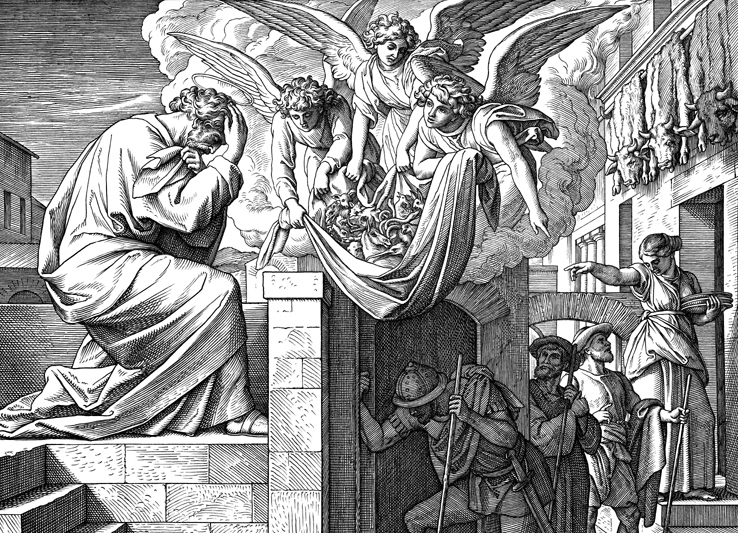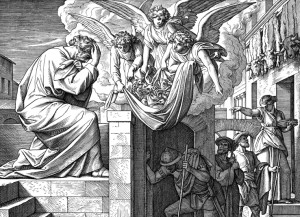God Shows No Partiality
Acts 10:1-17, 34-35
Monday–God Shows No Partiality
“He was a devout man who feared God with all his household; he gave alms generously to the people and prayed constantly to God” (Acts 10:2).
A video recently went viral. It showed a teenage boy on a New York sidewalk. It was a cold winter day and the boy was dressed only in a T-shirt and pants and holding a plastic garbage bag. The boy stood on the curb begging—pleading for people to help him. No one pays him any attention. The boy gave up. He crawled into the garbage bag and laid down in the fetal position. People walked past him and some even stepped over him, but no one stopped. No one that is until a homeless man stopped, laid down beside the boy, asked if he can help the boy and then embraced the boy in order to warm him.
Sometimes the holy surprises us and comes from somewhere we do not expect. The early Jewish Christians would have had a difficult time believing that gentiles could reflect the holy. It would have been even more difficult for them to believe that a soldier of the despised Roman army could exhibit holiness. God, they thought, wouldn’t work that way.
Thankfully the Spirit’s movement is not limited by our expectations. The Spirit uses people we don’t expect to be used in ways that surprise us. The Spirit even uses us in ways that are beyond our imagination. In order to capture more than a glimpse of God’s love and grace, its important for us to open our eyes, mind and heart.
O God of surprises, keep expanding our expectations and breaking down the barriers of what we believe to be acceptable. Amen.
Tuesday–God Shows No Partiality
“He had a vision in which he clearly saw an angel of God” (Acts 10:3).
One of the persistent fallacies to which Christians cling is that God operates on a system of rewards. A pastor and wife found themselves at the side of their young son’s hospital bed. He had been diagnosed with a childhood cancer. While their son was undergoing treatments for his cancer, the couple would strike up conversations with other parents of children in the pediatric oncology ward. Many of the parents expressed surprise that a pastor’s son would contract cancer. “I wouldn’t think that God would let something like that happen to a man of God,” they would say. Often that comment was followed by another, “Well, at least God is more likely listen to your prayers and answer them.” The pastor and wife would smile and think to themselves, “If only that were true.”
Some Christians might be startled to read that Cornelius saw an angel. He had done nothing that a good Jew wouldn’t have done. Corneliu gave alms to the poor like and Jews were called to do. He prayed at the traditional Jewish times of prayer. The disciples—the leaders of the new church—had been with Jesus for three years. They prayed, fasted and gave alms to the poor, too. Certainly they deserved more spiritual experiences than others—especially Cornelius–but there is no record that any of the disciples had visions or saw angels.
Good people are always surprised when bad things happen to them. They think they deserve better.
God is not in the reward business; rather God is in the gift giving business. Visions and dreams are gifts. So are salvation, relationships and life. Everything is a gift. With open hands and thankful hearts we receive all that the Lord pours into our lives.
Generous God, we give you thanks that though we have not earned any rewards, you have considered us worthy to receive your gifts. Amen.
Wednesday–God Shows No Partiality
“Your prayers and your alms have ascended as a memorial before God” (Matthew 10:4).
In the ancient times when animals were sacrificed as an act of worship, people would see the smoke from the sacrifice rise into the air. As the smoke rose, they believed that the god was receiving their gift and that they were sharing a meal together with their god. Their offering was a testament, a memorial of the relationship that they had with their god.
We use different items (offerings) to express the relationship that we have with people. Rings signify the relationship that we have with our spouse or partner. Flowers, candy, cards, hugs, holding hands and kisses are other ways that relationships are affirmed. Such affirmations are important to us—just ask a wife whose husband forgot their wedding anniversary or someone who didn’t receive a gift or a card on their birthday.
Cornelius’ prayers and loving actions were testaments to the relationship he had with God. They were ways that he said, “I love you,” to God, and “I am God’s,” to the people around him. Our words and actions continue to communicate these messages. They are memorials, reminders of God’s presence and power in our lives. How do you say, “I love you?”
God of relationships, may our words and actions declare our love for you, to you and to those around us. Amen.
Thursday–God Shows No Partiality
“When the angel who spoke to him had left, he called two of his slaves and a devout soldier” (Matthew 10:7).
Great things were afoot. Significant lessons were to be learned. The gospel of Jesus Christ was to be more clearly revealed and practically applied to life in the Church. In order for this to happen, God chose to work in partnership with people.
It is within God’s power to act alone in order to accomplish God’s will. God, though, doesn’t choose to move in this manner. In this instance God decided to work through Cornelius. The angel of God clearly appeared to Cornelius and instructed him on what he was to do. Cornelius’ reaction to the angel’s message was key to what God was doing. Cornelius obeyed. He sent three men to fetch Peter.
God still works that way. God uses people in order to accomplish God’s will. Lives of faith are lives lived in obedience—living sacrifices as Paul writes in Romans 12:1, that are holy and acceptable to God.
Loving Lord, we ask that you will guide us and give us the will, ability and courage to obediently follow you. Amen.
Friday–God Shows No Partiality
“Peter went up on the roof to pray … He saw the heaven open and something like a large sheet coming down” (Matthew 10:9, 11).
Multi-tasking is a symbol of this age. We have so much to do that we have to do it at the same time. We get a lot done, but it isn’t very good quality. Sometimes we cut corners on a report because we were busy gathering data for another project. We kid ourselves into thinking meaningful conversations can take place in front of the television amidst telephone calls and text messages. A crammed full calendar, we think, is the mark of importance and a full life.
There are some things that don’t work as we seek to nurture our relationship with God. Multitasking is one of them. Reading a devotional booklet while watching television with the family is an exercise in futility. Limiting our prayer life to “praying on the run” gives us many opportunities to talk but few to listen. God usually waits to speak to us until God has our undivided attention.
Peter went up to pray and during that prayer God’s spoke to him. Cornelius was alone and in prayer when he saw the angel. There’s a pattern here. Time alone with God is necessary if we want to nurture our relationship with God. God has much to tell us when we take the time to listen.
Holy presence, give us the ability to be disciplined and to make time to be with you in the midst of our busy schedules. Amen.
Saturday–God Shows No Partiality
“What God has made clean you must not call profane” (Matthew 10:15).
Rita was a picky eater. She didn’t like onions or mushrooms and would refuse to eat any food in which they were present. Broccoli wasn’t her favorite and she would never touch squash. Really the list of foods that she would eat was very limited. Rita’s parents would try to get her to expand her gastronomical repertoire, but to no avail. The offers of her friends to share their food with her were always turned down. Rita’s pickiness prevented her from eating some delicious and nutritious meals.
Often we act like Rita when it comes to people. Frequently we are satisfied to pick only people who look and think like us. We shy away from the different. Doing so limits our experience of the diverse human banquet that is before us. We miss out on so much.
We understand that the effects of Jesus’ life, death and resurrection extend to all people. God has made all people clean; none can be called profane or beneath God’s love. We are constantly invited to alter our perspective on people and live in the reality that we are all acceptable because of what God has done.
God of love, your love knows no boundaries. May our love mirror yours. Amen.
Sunday, April 19, 2015–God Shows No Partiality
“I truly understand that God shows no partiality” (Acts 10:34).
Christians sometimes think we know it all. We convince ourselves that we have our theology on straight and that we have figured out who God is and how God works. There’s nothing else we need to learn, so we close our minds to other thoughts and ideas.
Peter is sometimes shown in the gospels as an impetuous person who had difficulty understanding what Jesus was doing. After walking with Jesus for three years and becoming a leader in the fledgling church, Peter could have assumed that he knew all that he needed to know. Thankfully Peter was open to learn something new. What God revealed to Peter and what Peter finally understood changed the Church and changed to world.
Change is afoot in the Christian Church and in our lives. We are interacting more frequently with people of different faiths and must determine how to do that while still being true to what we believe. Christians are experiencing changes in the way we worship, changes in the way we communicate and changes in how we view men and women who are LGBT. We have many opportunities to learn something new and a God who wants to teach us more.
Oh God beyond imagination, give us open minds and hearts that we may be receptive to what you have to teach us. Amen.


